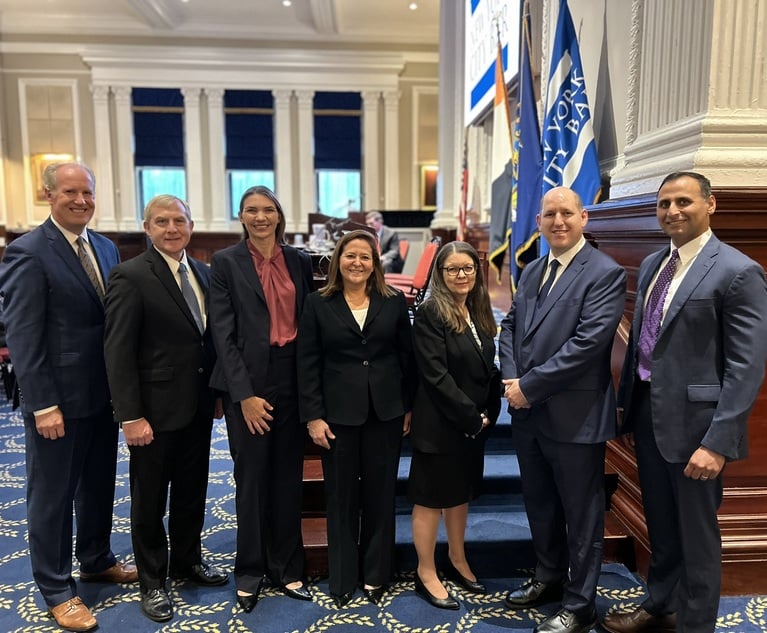Lifetime Achievement Award: Austin T. Fragomen Jr.
Austin invented modern immigration practice; he's introduced the industry to a number of innovations that are part of today's standard practice. He's a giant. But he's also a surprisingly soft-spoken, thoroughly engaging genius.
October 18, 2019 at 11:07 AM
5 minute read
 Austin T. Fragomen Jr., chairman, Fragomen, Del Rey, Bernsen & Loewy (Photo: David Handschuh/NYLJ)
Austin T. Fragomen Jr., chairman, Fragomen, Del Rey, Bernsen & Loewy (Photo: David Handschuh/NYLJ)
I met Austin Fragomen in 2000 when I interviewed to join the firm. I was eager to work there, and more than a little bit intimidated—even then, we were the world's top immigration firm, and Austin's name was on the building.
The interview was terrific. Austin invented modern immigration practice; he's introduced the industry to a number of innovations that are part of today's standard practice. He's a giant. But he's also a surprisingly soft-spoken, thoroughly engaging genius. He listened to me talk about myself: my life, my cases, what I was looking for in a firm.
He listened.
Since then, I've admired his ability to listen above his many other very fine qualities. Later, when I began to work with him directly, he listened to my opinions about our clients and our practice, took them seriously, and congratulated or corrected me as my thinking merited. He obviously takes the same care with clients and works tirelessly to help them solve the challenges they entrust him with. He becomes their business partner—a trusted advisor.
Listening seems like such a simple thing, but it's not. It's a skill that's acquired through practice and attention. It's rare. To listen: It's the best lesson Austin taught me.
Careful attention and receptivity helped him reshape the practice of immigration law. After the firm tackled an unpredictably large influx of cross-border work involving Hong Kong immigrants in 1997, Austin perceived untapped potential in his field—he was the first to realize that immigration was going to scale astronomically as globalization accelerated. And he built Fragomen around that growth, project by project, leading the firm through a worldwide expansion. A less observant lawyer would have missed such an opportunity. A less skilled lawyer would have failed to exploit it.
He also founded the American Council on International Personnel—the first trade organization for businesses that hire foreign workers. Under Austin's leadership, this organization, now part of the Society for Human Resource Management, grew significantly.
His passion for, and dedication to, his craft is inspiring. I worked side-by-side with Austin on a disruptive episode involving a radical overhaul in the Department of Labor's immigration process, known as PERM, which became effective in 2005. We had to reinvent the way we worked with our clients overnight. Austin pored over every rule, every regulation, every change, every process. He knew the history of the issues involved, and their legislative context. And he worked out how those changes were going to affect our clients years down the line.
That's because Austin understands more than the intricacies of his chosen field; he's studied the cultural, political and international forces that undergird the immigration landscape. He's a bit of a renaissance man. At Fragomen, we joke that our worldwide knowledge database is modeled on Austin's brain.
In addition to reshaping immigration law, Austin has introduced innovations to the legal industry that are common practice today. Again, his ability to listen is fundamental: He was one of the first to offer alternative fee arrangements, inspired by client requests for transparency and predictability in billing. He introduced the concept of level-to-level communications; a consummate communicator, he understood that clients prefer speaking with their counterparts at our firm, rather than only communicating with the most senior lawyer on the account. And Austin's famous talks during our 13th-floor lunches at Fragomen's old 515 Madison Avenue office inspired our client alert memos, a service now ubiquitous in the industry.
Any one of these innovations would mark a distinguished achievement for a lawyer after decades of practice; as would building a small U.S. immigration practice into a global enterprise with more than 50 offices worldwide. A lawyer of his accomplishment might be presumed to be aloof or even imperious. But Austin is the definition of a gentleman: He has an easy familiarity with every Fragomen lawyer and staff member he works with. He listens and empathizes. He learns about them and matches their strengths to the Firm's needs, thereby retaining top talent that best supports the evolving business of immigration law practice. Furthermore, he ensures that there are no barriers to their success besides the limits of their ambition and dedication. I'm reminded of the Spanish author Miguel de Cervantes, who said "fair and softly goes far." With such a management style it is no surprise that under his leadership, Fragomen has been celebrated for its unparalleled diversity.
I'll close on a personal note. Austin has been my mentor for years now; I've learned volumes from him. But more than any specific professional wisdom, I am grateful for his encouragement: He pushes me toward challenges for which I think I am unprepared, but for which he knows I am ready. And since I have unshakeable confidence in his judgment, when he trusts me, I trust myself.
I know that this is a confidence and an appreciation shared by everyone at Fragomen.
Carmita Alonso is a partner at Fragomen, Del Rey, Bernsen & Loewy.
This content has been archived. It is available through our partners, LexisNexis® and Bloomberg Law.
To view this content, please continue to their sites.
Not a Lexis Subscriber?
Subscribe Now
Not a Bloomberg Law Subscriber?
Subscribe Now
NOT FOR REPRINT
© 2025 ALM Global, LLC, All Rights Reserved. Request academic re-use from www.copyright.com. All other uses, submit a request to [email protected]. For more information visit Asset & Logo Licensing.
You Might Like
View All
Elizabeth Cooper of Simpson Thacher on Building Teams in a 'Relationship Business'
4 minute read
For Paul Weiss, Progress Means 'Embracing the Uncomfortable Reality'
5 minute read
Kenneth Feinberg Had Dreams of Being on the Big Screen. His 9/11 Victims Fund Gave Him an Unexpected Star Turn

City Bar Holds 32nd Annual Henry L. Stimson Medal Presentation
Trending Stories
- 1Uber Files RICO Suit Against Plaintiff-Side Firms Alleging Fraudulent Injury Claims
- 2The Law Firm Disrupted: Scrutinizing the Elephant More Than the Mouse
- 3Inherent Diminished Value Damages Unavailable to 3rd-Party Claimants, Court Says
- 4Pa. Defense Firm Sued by Client Over Ex-Eagles Player's $43.5M Med Mal Win
- 5Losses Mount at Morris Manning, but Departing Ex-Chair Stays Bullish About His Old Firm's Future
Who Got The Work
J. Brugh Lower of Gibbons has entered an appearance for industrial equipment supplier Devco Corporation in a pending trademark infringement lawsuit. The suit, accusing the defendant of selling knock-off Graco products, was filed Dec. 18 in New Jersey District Court by Rivkin Radler on behalf of Graco Inc. and Graco Minnesota. The case, assigned to U.S. District Judge Zahid N. Quraishi, is 3:24-cv-11294, Graco Inc. et al v. Devco Corporation.
Who Got The Work
Rebecca Maller-Stein and Kent A. Yalowitz of Arnold & Porter Kaye Scholer have entered their appearances for Hanaco Venture Capital and its executives, Lior Prosor and David Frankel, in a pending securities lawsuit. The action, filed on Dec. 24 in New York Southern District Court by Zell, Aron & Co. on behalf of Goldeneye Advisors, accuses the defendants of negligently and fraudulently managing the plaintiff's $1 million investment. The case, assigned to U.S. District Judge Vernon S. Broderick, is 1:24-cv-09918, Goldeneye Advisors, LLC v. Hanaco Venture Capital, Ltd. et al.
Who Got The Work
Attorneys from A&O Shearman has stepped in as defense counsel for Toronto-Dominion Bank and other defendants in a pending securities class action. The suit, filed Dec. 11 in New York Southern District Court by Bleichmar Fonti & Auld, accuses the defendants of concealing the bank's 'pervasive' deficiencies in regards to its compliance with the Bank Secrecy Act and the quality of its anti-money laundering controls. The case, assigned to U.S. District Judge Arun Subramanian, is 1:24-cv-09445, Gonzalez v. The Toronto-Dominion Bank et al.
Who Got The Work
Crown Castle International, a Pennsylvania company providing shared communications infrastructure, has turned to Luke D. Wolf of Gordon Rees Scully Mansukhani to fend off a pending breach-of-contract lawsuit. The court action, filed Nov. 25 in Michigan Eastern District Court by Hooper Hathaway PC on behalf of The Town Residences LLC, accuses Crown Castle of failing to transfer approximately $30,000 in utility payments from T-Mobile in breach of a roof-top lease and assignment agreement. The case, assigned to U.S. District Judge Susan K. Declercq, is 2:24-cv-13131, The Town Residences LLC v. T-Mobile US, Inc. et al.
Who Got The Work
Wilfred P. Coronato and Daniel M. Schwartz of McCarter & English have stepped in as defense counsel to Electrolux Home Products Inc. in a pending product liability lawsuit. The court action, filed Nov. 26 in New York Eastern District Court by Poulos Lopiccolo PC and Nagel Rice LLP on behalf of David Stern, alleges that the defendant's refrigerators’ drawers and shelving repeatedly break and fall apart within months after purchase. The case, assigned to U.S. District Judge Joan M. Azrack, is 2:24-cv-08204, Stern v. Electrolux Home Products, Inc.
Featured Firms
Law Offices of Gary Martin Hays & Associates, P.C.
(470) 294-1674
Law Offices of Mark E. Salomone
(857) 444-6468
Smith & Hassler
(713) 739-1250






